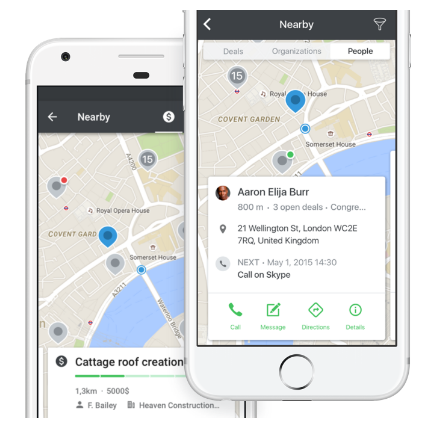And to better manage personal meetings, interactions, and your personal address books?
A "Personal CRM" could just be the solution.
During my schooldays, I installed the opensource SugarCRM on my little server, half for fun, half being pretty serious about maintaining all my contact information. Let me tell you right away, it's far too complex and only a pleasure, if you have fun and patience configuring systems. Google is the most common amongst how people manage their personal and business email accounts and to save their contacts. But it offers terrible support for everything beyond storing contact information. Apple is not much different, and its backend ensures that you've scatterd your contact information everywhere.
A "personal CRM" should be your personal CRM because it works for you and you take it for granted, regardless of whether you are working as an individual, are involved in a collaborative project, while working with another system, or in any conceivable other combination.
I want to commit myself to a personal CRM so that I can work smarter, not harder and get involved in with the people I work with privately and in my job. Although I live in a world of contact databases, calendars, tasks and emails management, I still can not use my tools as intelligently as I would like.
And of course, it's all about the process: reaching "Inbox Zero" through more than two email accounts, combining To-Dos and emails, synchronizing and automating annoying, recurring tasks, and maintaining meaningful relationships with the people that matter to me.
![]()
A "Personal CRM" to manage my personal relationships around the world.
A "Personal CRM" could be exactly what my doctor ordered!
CRM software has become a powerful tool for companies to organize their customer relationships, track contacts and keep up-to date of their communications. More and more private individuals are recognizing the value of their relationships and the added value in the underlying processes of managing realtionships. Personal CRM systems are becoming increasingly popular to help individuals do the same.
Most CRM tools are too extensive. They were developed for companies or teams. Or, they are too limited, because they were never intended as a CRM tool in the forst place.
A personal "Personal CRM" should be a simple tool for managing professional relationships, not leads. Instead of pipeline management, revenue forecasts, and other CRM sales functions, a Personal CRM should enable
A) to stay in touch with my contacts:
- Follow-ups,
- Reminder,
- Events and Tasks synchronized with Gmail
B) to remind me of the important details and activities:
- Notes,
- Tags,
- Conversation histories,
- Contact enrichment.
The most important thing again is the development of a relationship maintenance method that is easy and repeatable. There must be more than one address book and that is a software that is consistently used to be able to be used with the normal workflow.
- E-mail and email client integration is very interesting: a place where you probably already spend a lot of time anyway.
- As well as using the software on your smartphone, a device without which you probably can not live ;)
It allows you to manage your relationships at moments when you interact with your relationships.
Software tools and approaches
A clear and easy-to-use CRM like Pipedrive in a streamlined configuration has proven to be excellent. It is user-friendly, cross-platform, mobile, very customizable and can be integrated with many other APIs and tools.

The feature "Nearby Address" of my personal CRM Pipedrive shows me the addresses of my friends, acquaintances and business partners, no matter where in the world I travel.
Spreadsheets and Co.
Instead of using spreadsheets, Airtable, or Google Address Book and Contact Manager, you should use a product designed specifically for the use case "Relationship Management.
Maintaining records is regularly the biggest challenge. And also the most neglected aspect when choosing a suitable CRM! Use tools that facilitate and automate the creation of new contacts, the tracking of interactions with existing contacts, and the maintenance of data.
Where Google Contact Manager is too limited in its possibilities, Airtable is too flexible. Airtable offers a lot of flexibility and the different views are really nice. But just as you do not want to spend your free time with configuring and setting up complex systems like SugarCRM or Salesforce, you neither want to force tools like Airtable or Trello to become a CRM system. You want to use proven methods and proven software.
How You actually succeed with Personal Relationship Managment
However, if you're looking for a tool that lets you set up triggers that help you track interactions and build a strong network, it's a good idea to choose a simple system that's designed to do just that, and not spend more than Spotify and newspaper subscription while you're doing so.
You also want to keep your personal CRM tool up-to-date. You want to strengthen your behavior by making notes about interactions. You want to keep all your contacts as accessible as possible and make sure you talk to all those people you need to talk to. You want to keep track of your relationships, especially of those in your network who you want to continue working with. You want to set and forget desired follow-ups for each contact and never have to worry about keeping in touch with those who matter.
If you want to take your relationship care serious and build a Personal CRM that is useful to you, then you need something that can scale better than a spreadsheet. It is then that you want a professional Personal CRM.
If you don't use a CRM on a daily basis, you don't have a Relationship with your People.




